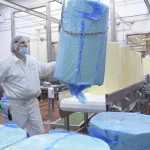
Brazil continues to be the main destination for Uruguayan and Argentine dairy products, largely due to the application of the Common External Tariff (TEC) of 28% to dairy products from other origins, which makes these products uncompetitive in the market. brazilian market.
The deficit of dairy products in Brazil leads them to increase import volumes, they buy larger volumes and offer better prices to Argentina and Uruguay, their main suppliers.
Since December of last year, the average value of exports to Brazil has remained stable around US$3,800 per ton. In the first half of June, the average value was US$3,872/t, about US$100 above the sale price to Algeria.
According to MilkPoint, for the coming months, even with an expectation of a reduction in imports, due to the drop in prices in the Brazilian market and the consequent reduction in the competitiveness of imported volumes, the availability of milk should show growth in in relation to the first semester due to the seasonal increase in production.
This could change the trend towards the second half of the year.
The Brazilian government, together with the dairy industrial sector, are analyzing restricting dairy imports from Uruguay and Argentina, to safeguard their national industry.
Brazilian producers face a double challenge: climatic effects and the pressure of imports.
Producers in southern Brazil are alert and concerned about the impact of imports. His production costs go up, the price of his milk goes down, and this brutal competition turns the profitability of his business upside down. They demand the protection of their government.
The region’s economy is in danger, since milk production plays a key role in job creation and local commerce.
Added to an already difficult situation are the effects of recent droughts that affected production, leaving a shortage of feed for livestock.
The protectionist measures that are expected
It is expected that the authorities are attentive to these realities and adopt measures to protect local producers, preserving employment and the rural economy.
These measures could include incentive and support policies for milk producers in Rio Grande do Sul, such as the reduction of taxes and fees, the availability of resources and technical assistance to improve production efficiency and thus reduce production costs. .
It would also be very useful to make consumers aware of the importance of valuing and supporting local milk production, which has generally been declining at the country level, through advertising campaigns that encourage the consumption of national products, emphasizing quality and value. socioeconomic of choosing local products.
Why is it not easy to apply protectionist policies?
In the current context, government protection measures seem to present complications, since the levies violate the Mercosur agreement.
The possibility of agreements between the countries, such as limiting the quantities imported, as happened previously with Argentina, seems less likely at present.
One of the issues at stake is the Brazilian government’s interest in maintaining good relations with neighboring countries, as part of its strategy to position itself as an important regional political player.
No less relevant is that the current priority of the Brazilian government is to reduce interest rates, and the continuous reduction in inflation plays a key role in this regard, so that measures that can increase inflation, such as making it difficult for milk to enter cheaper, they will not be easily implemented.























